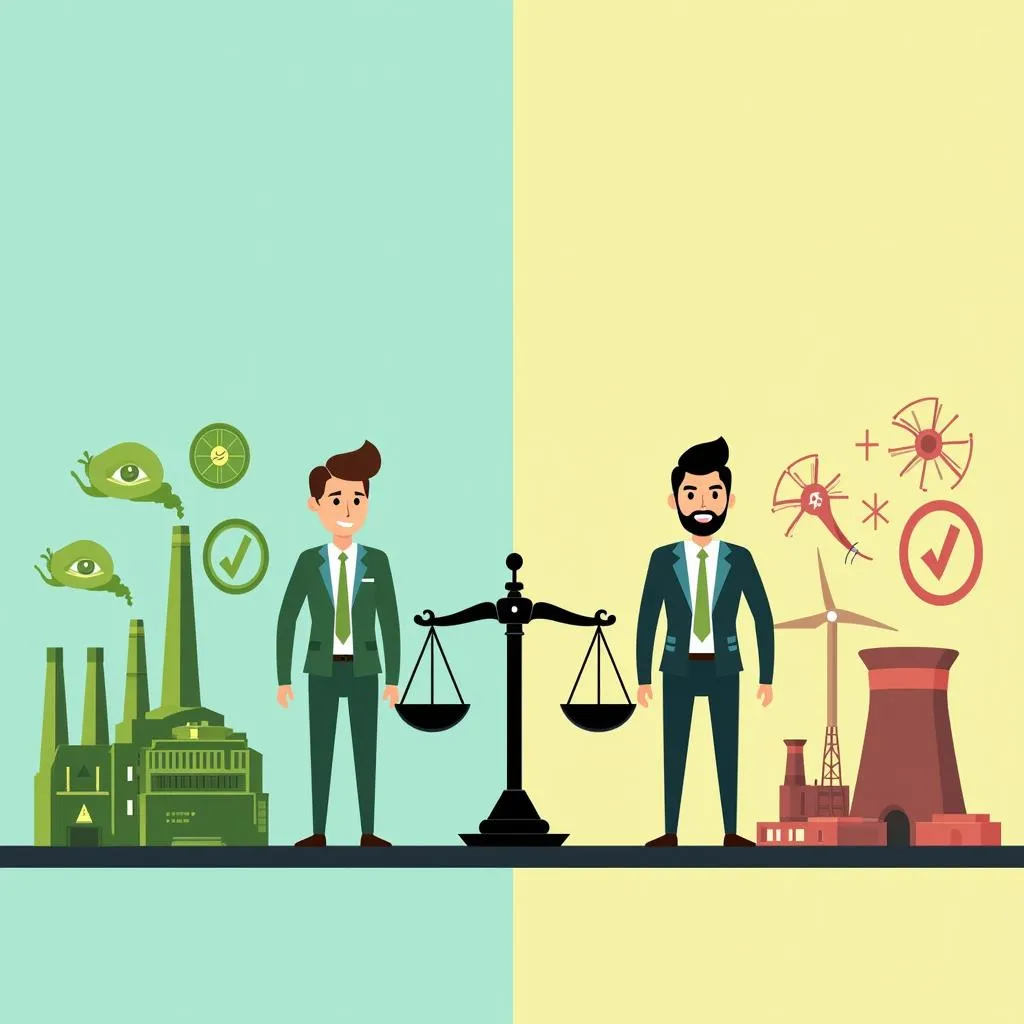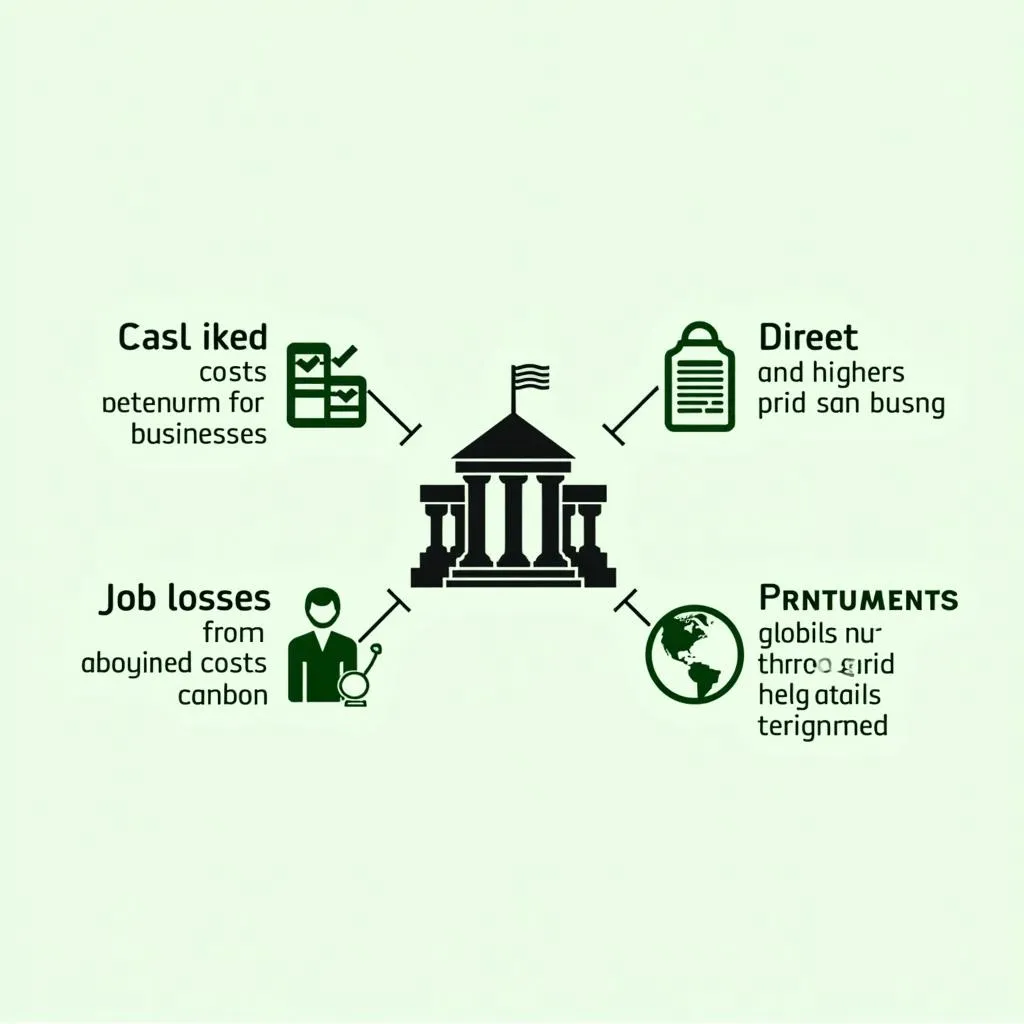The topic of carbon tax implementation to reduce emissions has been a recurring theme in IELTS Writing Task 2 exams. Based on recent trends and the growing global concern for climate change, it’s highly likely that this subject will continue to appear in future tests. Let’s examine a relevant question that has appeared in past IELTS exams:
Nội dung bài viết
Some people believe that governments should enforce a carbon tax to reduce emissions. Others argue that this would unfairly penalize businesses and individuals. Discuss both views and give your own opinion.
Analyzing the Question
This question requires candidates to discuss two contrasting viewpoints on carbon tax implementation and provide their personal opinion. The key aspects to address are:
- The argument for government enforcement of carbon tax
- The counter-argument that it unfairly penalizes businesses and individuals
- Your own perspective on the issue
Let’s explore sample essays for different band scores, starting with a high-scoring response.
Sample Essay 1 (Band 8-9)
Climate change is undeniably one of the most pressing issues of our time, and governments worldwide are grappling with ways to mitigate its effects. One proposed solution is the implementation of a carbon tax to reduce emissions. While some argue that this is a necessary step, others contend that it unfairly burdens businesses and individuals. In my opinion, a well-designed carbon tax can be an effective tool in combating climate change, provided it is implemented thoughtfully and equitably.
Proponents of carbon tax argue that it is a crucial measure to incentivize reduced carbon emissions. By putting a price on carbon, governments can encourage businesses and individuals to adopt more environmentally friendly practices and technologies. This market-based approach can drive innovation in clean energy and promote sustainable economic growth. Moreover, the revenue generated from carbon taxes can be reinvested in green infrastructure and research, further accelerating the transition to a low-carbon economy.
On the other hand, critics argue that carbon taxes disproportionately affect certain industries and low-income households. Energy-intensive sectors may face increased operational costs, potentially leading to job losses or reduced competitiveness in the global market. Similarly, lower-income families might struggle with higher energy bills and increased prices for goods and services. These concerns highlight the importance of designing carbon tax policies that address equity issues and provide support for affected groups.
In my view, while the concerns about fairness are valid, they should not preclude the implementation of carbon taxes altogether. Instead, governments should focus on creating balanced policies that mitigate negative impacts while still achieving emission reduction goals. This could include measures such as gradual implementation, targeted subsidies for clean technology adoption, and revenue redistribution to support affected communities and industries. By taking a nuanced approach, governments can harness the benefits of carbon taxation while minimizing its drawbacks.
In conclusion, the debate over carbon tax implementation reflects the complex challenge of addressing climate change while maintaining economic stability and fairness. While there are valid arguments on both sides, I believe that a carefully crafted carbon tax policy can be an effective and necessary tool in our global efforts to reduce emissions and combat climate change. The key lies in striking a balance between environmental goals and socioeconomic considerations, ensuring that the transition to a low-carbon future is both effective and equitable.
 Illustration of carbon tax debate
Illustration of carbon tax debate
Explanation of Band 8-9 Score
This essay demonstrates several qualities that contribute to its high band score:
-
Task Achievement: The essay fully addresses all parts of the task, discussing both viewpoints and clearly stating the writer’s opinion.
-
Coherence and Cohesion: The essay is well-organized with clear paragraphing and effective use of cohesive devices. Ideas flow logically from one paragraph to the next.
-
Lexical Resource: A wide range of vocabulary is used accurately and appropriately, including topic-specific terms like “carbon tax,” “emissions,” and “clean energy.”
-
Grammatical Range and Accuracy: The essay showcases a variety of complex sentence structures with a high degree of accuracy. There are no noticeable grammatical errors.
-
Development of Ideas: Each main point is well-developed with relevant examples and explanations, demonstrating a sophisticated approach to the topic.
Sample Essay 2 (Band 6-7)
The issue of carbon tax implementation is a topic of debate among many people. Some think governments should enforce this tax to reduce emissions, while others believe it’s not fair to businesses and individuals. This essay will discuss both views and give my opinion.
Those who support carbon tax say it’s important for reducing pollution. When companies have to pay for their carbon emissions, they might try to find cleaner ways to operate. This could lead to less pollution and help fight climate change. Also, the money from carbon taxes could be used by governments to support green energy projects.
However, people against carbon tax argue that it’s not fair. Small businesses might struggle to pay the extra costs, and this could lead to job losses. Regular people might also have to pay more for things like electricity and fuel, which can be hard for those with low incomes. Some say that big companies might just move to countries without carbon taxes, which doesn’t solve the global problem.
In my opinion, I think carbon tax can be a good idea if it’s done carefully. Governments should find ways to help small businesses and low-income families deal with the extra costs. Maybe they could offer tax breaks or financial support to those who are most affected. It’s important to balance the need to reduce emissions with the need to protect jobs and the economy.
To conclude, while carbon tax has both advantages and disadvantages, I believe it can be a useful tool for fighting climate change if implemented thoughtfully. Governments need to consider all aspects and try to make it fair for everyone.
 Challenges in implementing carbon tax
Challenges in implementing carbon tax
Explanation of Band 6-7 Score
This essay demonstrates characteristics typical of a Band 6-7 response:
-
Task Achievement: The essay addresses all parts of the task, though the treatment of each point is less developed compared to the Band 8-9 essay.
-
Coherence and Cohesion: There is a clear overall progression, but the use of cohesive devices is less sophisticated. Paragraphing is appropriate.
-
Lexical Resource: The vocabulary used is adequate for the task, with some attempt at using less common lexical items. However, the range is more limited compared to the higher band essay.
-
Grammatical Range and Accuracy: There is a mix of simple and complex sentence structures, with generally good control. Some minor errors may be present but do not impede communication.
-
Development of Ideas: Main ideas are relevant and supported, but the level of detail and explanation is less extensive than in the Band 8-9 essay.
Key Vocabulary to Remember
-
Carbon tax (noun) – A fee imposed on the burning of carbon-based fuels
Pronunciation: /ˈkɑːrbən tæks/ -
Emissions (noun) – The production and discharge of something, especially gas or radiation
Pronunciation: /ɪˈmɪʃənz/ -
Incentivize (verb) – To motivate or encourage someone to do something
Pronunciation: /ɪnˈsentɪvaɪz/ -
Mitigate (verb) – To make less severe, serious, or painful
Pronunciation: /ˈmɪtɪɡeɪt/ -
Disproportionately (adverb) – To an extent that is too large or too small in comparison with something else
Pronunciation: /ˌdɪsprəˈpɔːrʃənətli/ -
Energy-intensive (adjective) – Requiring a large amount of energy to produce or operate
Pronunciation: /ˈenərdʒi ɪnˈtensɪv/ -
Equitable (adjective) – Fair and impartial
Pronunciation: /ˈekwɪtəbl/ -
Sustainability (noun) – The ability to maintain at a certain rate or level
Pronunciation: /səˌsteɪnəˈbɪləti/ -
Infrastructure (noun) – The basic physical and organizational structures and facilities needed for the operation of a society or enterprise
Pronunciation: /ˈɪnfrəstrʌktʃər/ -
Competitiveness (noun) – The quality of being as good as or better than others of a comparable nature
Pronunciation: /kəmˈpetɪtɪvnəs/
Conclusion
The topic of carbon tax implementation to reduce emissions is likely to remain relevant in future IELTS Writing Task 2 exams. To prepare effectively, practice writing essays on related themes such as:
- The role of government in combating climate change
- Balancing environmental protection with economic growth
- The role of international organizations in addressing climate change
- The impact of environmental policies on businesses and individuals
- Creating a circular economy in manufacturing
Remember to analyze the question carefully, plan your response, and practice timed writing to improve your skills. Consider sharing your practice essays in the comments section below for feedback and discussion with other learners. This active engagement can significantly enhance your IELTS Writing Task 2 performance.
 IELTS Writing Task 2 practice tips
IELTS Writing Task 2 practice tips
Should there be a global initiative to address climate change? This question is closely related to our topic and provides another perspective on global environmental policies. As you continue to practice, remember that a well-structured essay with clear arguments and relevant examples is key to achieving a high band score in IELTS Writing Task 2.


